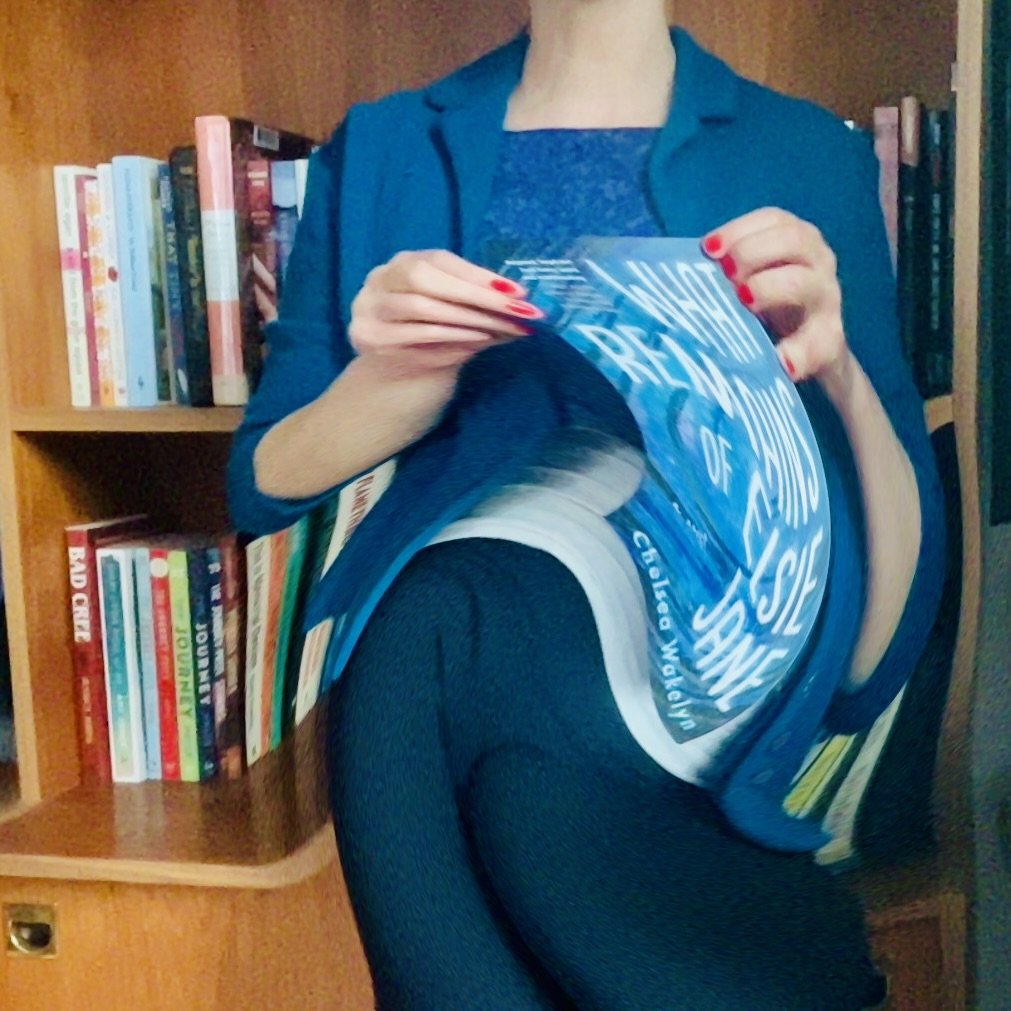From issue 2.7 September 2023 of Girls to the Front!
A mini-review and “Why I Wrote This” for Chelsea Wakelyn’s What Remains of Elsie Jane
I did not expect to laugh out loud to myself while reading a novel about a woman grieving her husband’s untimely death due to drug poisoning. But I did. A lot. Elsie Jane is refreshingly real, honest, sarcastic, vulnerable, raw, imperfect, and did I mention funny? Chelsea Wakelyn’s humour reminds me of one of those variety shows that Med students put on—the morbid humour brought on by those who’ve been well beyond the edge of polite knowledge of the human body, who’ve gotten comfortable within the borders of death and near-death. For instance, an email written by Elsie Jane to her uncle about her grandmother, who’s hovering over death’s doorstep: “If Grandma gets the other leg amputated, maybe someone can put a handle over her belly so she can be picked up like a suitcase.” Through this inconceivable hilarity, Wakelyn lets us into Elsie’s suffering. We see how far beyond the limits of social mores she’s fallen. The book shifts between Elsie’s present-tense unravelling life and her memories of and saved email messages from her late husband, Sam. We begin by thinking their relationship was idyllic but through the novel, Elsie slowly shares with us the stress that Sam’s struggle with addiction caused in their family. She’s angry with him for leaving her and their young children; she wishes she “could grab Sam by the back of the head and shove his face in the mess he’d left.” She sleeps with a toxic man, a man Sam knew and was jealous of, no less, in possibly an attempt at self-annihilation. She does all the wrong things. She does not grieve “how respectable women grieve.” This, in my opinion, makes Elsie Jane the perfect protagonist and makes What Remains of Elsie Jane the perfect book.
Why I Wrote What Remains of Elsie Jane
by Chelsea Wakelyn
I started writing the story that became What Remains of Elsie Jane in 2016, in the aftermath of my partner’s death. I’d just been through what felt like an apocalypse. I was struggling with solo parenthood, with the snake bite shock of losing my person, and with a grief that was complicated by the stigma of drug poisoning (and an unfortunate pile of other recent losses.) Caught in a vortex of depersonalization and derealization, my day-to-day life felt like LARPing, and I was searching— in books, in movies, in song— for something that captured the very specific unreality of my new world. I did find some good things, and they did help. Mount Eerie’s album A Crow Looked At Me helped. Douglas Hofstader’s I Am A Strange Loop helped. The movie Safety Not Guaranteed didn’t really help, but it inspired the Craigslist ad that became the central conceit of Elsie Jane (so thanks, screenwriter Derek Connolly, and sorry for the unsolicited DM.)
When I found myself a solo parent, I was sure I’d have to give up writing entirely. I’d been working on a novel for years, but in light of these new circumstances and the intensity of the grief, that book felt stupid. It was about a woman who, in the wake of her mother’s death, loses touch with reality and becomes convinced that there’s a portal to the multiverse on Mitlenatch Island. Though I abandoned that project, I ended up folding a few of its themes into the dough of Elsie Jane.
Grief is a mean, snarling dog of a thing to encounter, but it’s also something that connects us. We all lose things, and the dog finds us. It comes for and swallows us all, and we just have to live inside the guts of the dog for a while. And if you’ve been swallowed, if you’re living in the guts of the dog, sometimes the best thing to do is make up a story about how it might be if you could wish the dog away from the inside out. I wrote What Remains of Elsie Jane partially as a wish, and partially as an attempt to map and describe the dog’s guts for future tenants. While the book is not memoir, the emotional truth of the story comes from the core of my life.
Chelsea Wakelyn’s debut novel, What Remains of Elsie Jane, was published by the Rare Machines imprint of Dundurn Press in January, 2023. Chelsea was born in Kwaka’wakw territory and grew up on a remote lake in Black Creek. She spent her teen years in Victoria skipping class and writing poetry on the beach. She holds a Masters degree in Health Leadership, has worked in mental health and substance use and health systems improvement for 18 years, and is now a clinical initiatives lead implementing strategies to mitigate the Toxic Drug Crisis. Chelsea is currently at work on her second novel, Melinoë, a contemporary dramedy about intergenerational trauma, mental health, doppelgängers, ketamine-infused VR therapy and one woman’s ill-advised road trip to the Métis homelands with an invisible friend from Hades. Chelsea is of Scottish, Irish, and Red River Métis heritage and is a citizen of the Métis Nation of B.C. She lives in Snuneymuxw territory (colonially: Nanaimo) with her partner and two children.


